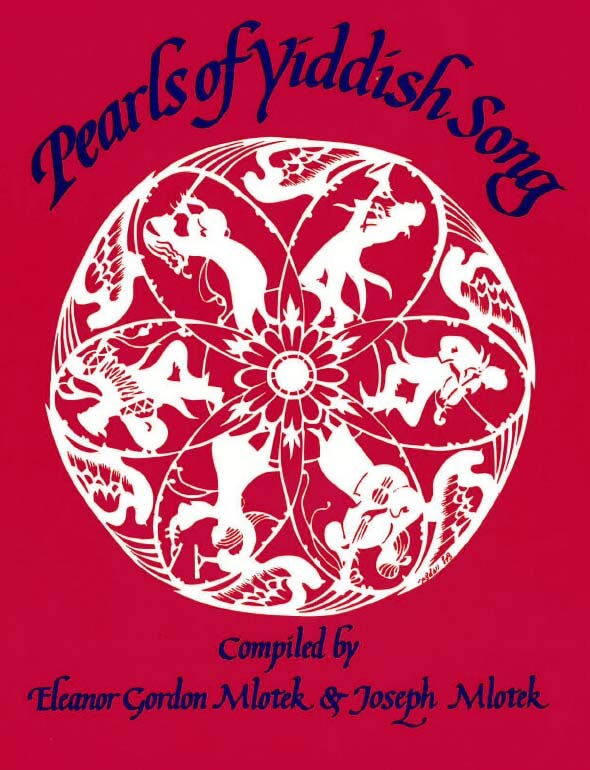One of the early labor songs directed at working women. Poem by Dovid Edelshtat (1866-1892) and published in New York in Di fraye arbeter shtime (Free Voice of Labor) on May 8, 1891. Text and music published in 1918 by Y. Glatshteyn in Warsaw.
The song was widely disseminated in Eastern Europe. A. Litvak, a leader of the Jewish Labor Bund, writes that “Arbeter-froyen” was one of the first and most popular songs in Tsarist Russia. In a memoir, Abba Levin recalls that during the tanners’ strike in 1897 in Krinek, near Grodno, the strikers sang workers’ songs with great enthusiasm, mainly Edelshtat’s “Arbeter froyen,” “In kamf” (In the struggle), and others. Similarly, memoirist Sholem Levin relates that the song was one of the most popular songs in Minsk in 1896-97. It was revived in the Off-Broadway musical The Golden Land (1982-87).

Working women, suffering women.
Women who languish at home and in the factory.
Why are you standing on the sidelines?
Why aren’t you helping build the temple of freedom, of human happiness?
Help us carry the red banner
forward, through the storm, through dark nights!
Help us spread truth and light
among ignorant, lonely slaves!
Help us raise the world from its squalor
And achieve everything we value.
to fight together, like mighty lions –
for freedom, equality, our ideals!
More than once have brave women
made tyrants and thrones tremble.
They have shown that they can be trusted,
through the bitterest storms, with the holy flag.
Arbeter-froyen, laydnde froyen!
Froyen, vos shmakhtn in hoyz un fabrik,
Vos shteyt ir fun vaytn, vos helft ir nit boyen
Dem templ fun frayhayt, fun mentshlekhn glik?
Helft undz trogn dem baner dem roytn,
Forverts, durkh shturem, durkh fintstere nekht!
Helft undz varhayt un likht tsu farshpreytn,
Tsvishn umvisnde, eltne knekht!
Helft undz di velt fun ir shmuts derheybn!
Ales opfern, vos undz iz lib;
Kemfn tsuzamen, vi mekhtike leybn
Far frayhayt, far glaykhhayt, far undzer printsip!
Nit eyn mol hobn shoyn nobele froyen,
Gemakht tsitern henker un tron,
Zey hobn getsaygt, az men ken zey fartroyen,
In biterstn shturem di heylike fon.
אַרבעטער־פֿרױען, לײַדנדע פֿרױען!
פֿרױען, װאָס שמאַכטן אין הױז און פֿאַבריק,
װאָס שטײט איר פֿון װײַטן, װאָס העלפֿט איר ניט בױען
דעם טעמפּל פֿון פֿרײַהײט, פֿון מענטשלעכן גליק?
העלפֿט אונדז טראָגן דעם באַנער דעם רױטן,
פֿאָרװערטס, דורך שטורעם, דורך פֿינצטערע נעכט!
העלפֿט אונדז װאַרהײט און ליכט צו פֿאַרשפּרײטן,
צװישן אומװיסנדע, עלנטע קנעכט!
העלפֿט אונדז די װעלט פֿון איר שמוץ דערהײבן!
אַלעס אָפּפֿערן, װאָס אונדז איז ליב;
קעמפֿן צוזאַמען, װי מעכטיקע לײבן
פֿאַר פֿרײַהײט, פֿאַר גלײַכהײט, פֿאַר אונדזער פּרינציפּ!
ניט אײן מאָל האָבן שױן נאָבעלע פֿרױען,
געמאַכט ציטערן הענקער און טראָן,
זײ האָבן געצײַגט, אַז מען קען זײ פֿאַרטרױען,
אין ביטערסטן שטורעם די הײליקע פֿאָן.
Song Title: Arbeter Froyen

First published in 1988 as Pearls of Yiddish Song: Favorite Folk, Art and Theatre Songs, this anthology contains 115 songs. Some material had never been published, while others, included in rare song collections or sheet music, were largely inaccessible. The songs presented reflect Jewish life in Eastern Europe and the United States and depict childhood, love, family celebrations, poverty, work and struggle. There are also songs from the Hasidic and Maskilic movements, songs of Zion and of America, as well as songs from the Yiddish theater.
The title of this anthology derives from the weekly two-page feature column “Pearls of Yiddish Poetry,” which the compilers Yosl and Chana Mlotek initiated in 1970 in the Yiddish newspaper Der Forvertz (the Yiddish Daily Forward). Hundreds of readers from around the world — including authors, composers, singers, actors — became co-participants in this collective folk project and recalled melodies, lines, fragments, stanzas and their variants of songs, poems, and plays which they had heard in their youth. At first, readers sent in only written material. Later, they also taped songs on cassettes, many of whose melodies had, until then, never been recorded. They also identified and supplied missing information regarding lyricists, poets, and composers and described the circumstances surrounding the songs’ origins, their dissemination, diffusion and impact.